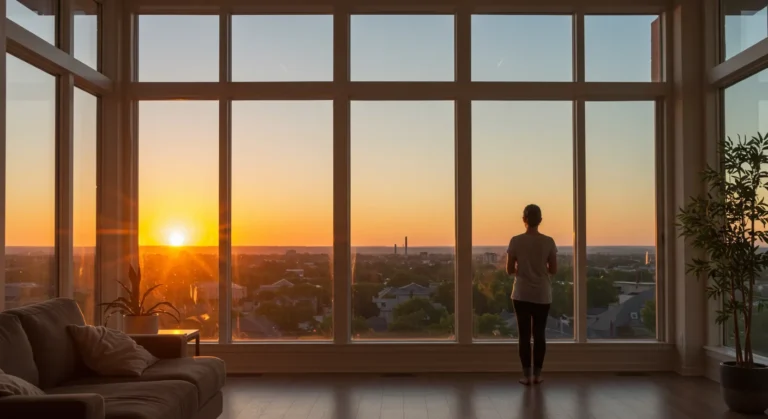How to Sleep Better: 3 Simple Fixes for Deeper Rest and Brighter Days

How to sleep better, you know that feeling, right? Your head hits the pillow and suddenly your brain decides it’s time for a full-blown strategy meeting about tomorrow’s presentation, last week’s awkward conversation, and whether you remembered to lock the front door.
“I’m exhausted, but I just can’t fall asleep.”
Been there. Done that. Bought the expensive melatonin supplements.
If you’re nodding along (probably while fighting off another yawn), you’re definitely not alone. Whether you’re grinding through back-to-back Zoom calls, trying to optimize your health with the latest biohacking trends, or just plain tired of counting sheep at 3 AM, poor sleep is basically robbing you blind—stealing your energy, focus, and that sunny disposition you used to have.
Here’s the thing though: you can absolutely fix this mess.
I’m going to walk you through some science-backed, no-nonsense strategies to improve sleep naturally. No weird pills, no $500 gadgets that promise to revolutionize your REM cycles, and definitely no crystal healing nonsense. Just real, practical stuff that actually works.
Why Your Sleep Schedule is More Broken Than You Think
Let’s get one thing straight—you don’t suck at sleeping because you lack willpower. Sleep isn’t something you can muscle through like a tough workout. It’s pure biology, and frankly, modern life has thrown our biology completely out of whack.
Here’s what’s probably sabotaging your nights:
Your circadian rhythm is having an identity crisis. Think of it as your body’s internal GPS, except it’s been recalculating the route for months and still can’t figure out where you’re supposed to be going.
Your sleep hygiene is about as organized as a teenager’s bedroom. Environment matters more than you think, and those little habits you’ve picked up? They’re not doing you any favors.
Stress and anxiety decided to throw a rave in your nervous system right when you need peace and quiet. Thanks, brain.
Blue light exposure is tricking your mind into thinking it’s still daytime. Your phone might as well be a portable sun at this point.
You treat your sleep schedule like more of a suggestion than a rule. Consistency isn’t just for gym routines—your body craves it for sleep too.
So what exactly is this circadian rhythm thing everyone keeps talking about?
Define circadian rhythm in simple terms: it’s basically your body’s built-in 24-hour timer that controls when you feel alert versus when you feel like you could face-plant into your pillow. Light, routine, and daily habits all mess with this internal clock—for better or worse.
The Game-Changing Sleep Fixes That Actually Work
Alright, enough with the problems. Let’s talk solutions that you can start using tonight.
Fix #1: Get Your Internal Clock Back on Track
This is where circadian rhythm light therapy becomes your new best friend, though it’s way simpler than it sounds.
Wake up at the same time every single day. Yes, even on weekends. I know, I know—weekend sleep-ins feel like a basic human right. But your circadian rhythm doesn’t care about your social calendar.
Get morning sunlight within 30 minutes of waking up. Spend 10-20 minutes outside with your coffee or tea. No sunglasses, no window barriers—just you, the morning light, and maybe some questionable bedhead.
Dim the lights about 2 hours before your target bedtime. Your brain needs darkness to produce melatonin, and those bright overhead lights are basically telling your body to stay alert.
This approach is honestly the fastest way to fix your sleep schedule naturally. It’s like giving your internal clock a gentle but firm nudge back to reality.
Fix #2: Create Evening Rituals That Don’t Suck
Here’s where bedtime rituals get interesting. You need a solid 30-60 minute wind-down routine that signals to your nervous system: “Hey, party’s over, time to chill.”
Try mixing and matching these:
Light stretching or gentle yoga for sleep. Nothing fancy—just some basic moves to release the day’s tension. Your tight shoulders will thank you.
Warm herbal tea becomes your evening sidekick. Chamomile and passionflower are classics, but honestly, any caffeine-free tea works if it makes you feel cozy.
Keep a sleep diary or do some brain-dump journaling. Getting those swirling thoughts out of your head and onto paper is surprisingly therapeutic.
Ditch the screens for at least an hour before bed. If you absolutely must scroll, grab some blue light blocking glasses. Your melatonin production will appreciate the gesture.
These rituals sleep habits aren’t just nice-to-haves—they’re actual signals to your nervous system that it’s time to downshift.
Fix #3: Master the Art of Breathing Your Way to Sleep
When you can’t fall asleep and your mind is racing, these breathing exercises for sleep can be absolute game-changers:
The 4-7-8 technique: Inhale for 4 seconds, hold for 7, exhale for 8. It sounds almost too simple, but it works by activating your parasympathetic nervous system—basically your body’s chill-out mode.
Progressive muscle relaxation means tensing and then releasing different muscle groups. Start with your toes and work your way up. It’s like a factory reset for physical tension.
Try some basic meditation for sleep and anxiety. Even five minutes of focusing on gratitude or doing simple visualization can quiet that mental chatter.
When Natural Isn’t Enough: Gentle Sleep Support
Look, sometimes you need a little extra help, and that’s completely okay. Here are some natural remedies for deep sleep that won’t leave you groggy:
Commonly suggested supplements for sleep include:
- Magnesium glycinate helps calm your nervous system without making you feel drugged
- L-theanine promotes relaxation without that drowsy hangover effect
- Melatonin can help reset your sleep schedule, but use it strategically—it’s not meant to be a permanent solution
Tech that doesn’t break the bank:
- Binaural beats sleep music can help guide your brain into deeper rest states
- Sleep tracking devices like fitness watches give you actual data about your patterns
- Apps that monitor your sleep diary and help you spot trends
What to Do When Sleep Just Won’t Come
We’ve all been there—lying in bed, wide awake, getting more frustrated by the minute. Here’s your game plan for those “I can’t sleep” nights:
Get out of bed after 20 minutes of tossing and turning. Go read something boring in dim light or do some gentle stretches. Staying in bed just creates negative associations with your sleep space.
Keep your phone in another room. Seriously. That blue light is like kryptonite for sleepy vibes.
Try some mental repetition. Count backward from 100 by threes, or repeat a calming word. Give your anxious brain something to focus on besides tomorrow’s to-do list.
The key is changing your mindset from “I can’t sleep, what should I do?” to “I know how to support my body when it’s struggling.”
The Bottom Line on Better Sleep
Your sleep problems aren’t permanent, and you’re not broken. Modern life has just confused your body’s natural rhythms, but with the right signals at the right times, quality sleep becomes possible again.
And here’s the beautiful part: when you start sleeping better, everything else improves too. Your energy levels stabilize, your focus sharpens, your mood lifts, and even your digestion works better.
Better sleep habits don’t require perfection—they just need consistency and a little patience with yourself. Start with one or two changes that feel manageable, and build from there.
Trust me, your future well-rested self will thank you for taking that first step tonight.
If you’re curious about how a good night’s rest can truly make a difference, you might enjoy exploring our Ultimate Guide to Deep Sleep.
Disclaimer: The information provided is for educational purposes only, not a substitute for professional medical advice. Always consult a healthcare professional.







